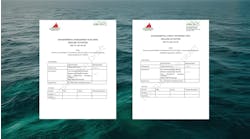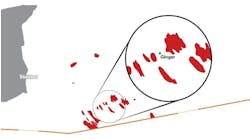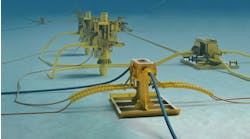Steel grade issues could hamper Iranian-Russian offshore gas cooperation
Offshore staff
OSLO, Norway — Metallurgical issues could impact Gazprom’s plans to support Iran’s offshore gas field development plans, according to Rystad Energy.
Both countries remain under sanctions from Europe and Japan, with European and Japanese oil country tubular goods (OCTG) and steel manufacturers unable to make shipments to either country. And as the consultant points out, it is OCTG producers from these regions that dominate global supply of corrosion-resistant alloy (CRA) and high-alloy OCTG grades.
In the Persian Gulf, Iran’s South Pars Field—shared with Qatar, where it is known as the North Field—is the world’s largest offshore gas source but contains highly sour gas.
The corrosive qualities of the gas mean that all wells drilled on the field require very high grades of nickel alloy OCTG tubing such as Alloy 28, Rystad said. Research suggests that development of the North Pars Field will also require Alloy 28 or equivalent OCTG tubing grades.
Another major Iranian gas field is Kish, where the onshore portion under development has been using Super 13Cr tubing grades sent from China. However, Rystad has heard that some of the 13Cr initially exported to Iran has experienced leakage issues and may have to be upgraded.
Gazprom signed a memorandum of understanding last month with National Iranian Oil Co. (NIOC) on supporting development of both North Pars and Kish, in addition to providing pressure enhancements to South Pars.
But the consultant claims it could take a long time and large investments for Russia’s steel industry to produce significant quantities of high-alloy grades. So options for fast-tracking development of the Iranian fields could be limited until the sanctions are lifted.
The drilling programs planned for the North Pars and Kish offshore fields are said to be extensive, with the NIOC subsidiary now responsible for North Pars recently working on plans for a redevelopment of the field involving four platforms and 32 wells.
Kish falls under the control of NIOC subsidiary Iranian Offshore Oil Co. (IOOC), which is understood to be considering two platforms and 11 wells, but with higher alloy grades than the Super 13Cr OCTG tubing that caused the onshore leakage issues.
Rystad does not believe that Russia’s steel industry is capable of manufacturing CRA and Super 13Cr OCTG grades, which would entail supplying high-grade steel billets to Russian pipe manufacturers.
Implementing the costly adjustments needed to the country’s steel industry could take years to deliver.
An added complication is that NIOC does not list any Russian OCTG mills as approved suppliers for premium connections. As all the offshore gas wells will need premium OCTG connections, if the required grade of CRA OCTG were to be produced in Russia and TMK’s premium connection applied, NIOC would have to audit and approve this connection.
This would add more time to acceptance of CRA OCTG grades from Russia for the Iranian fields, Rystad claimed.
08.15.2022



